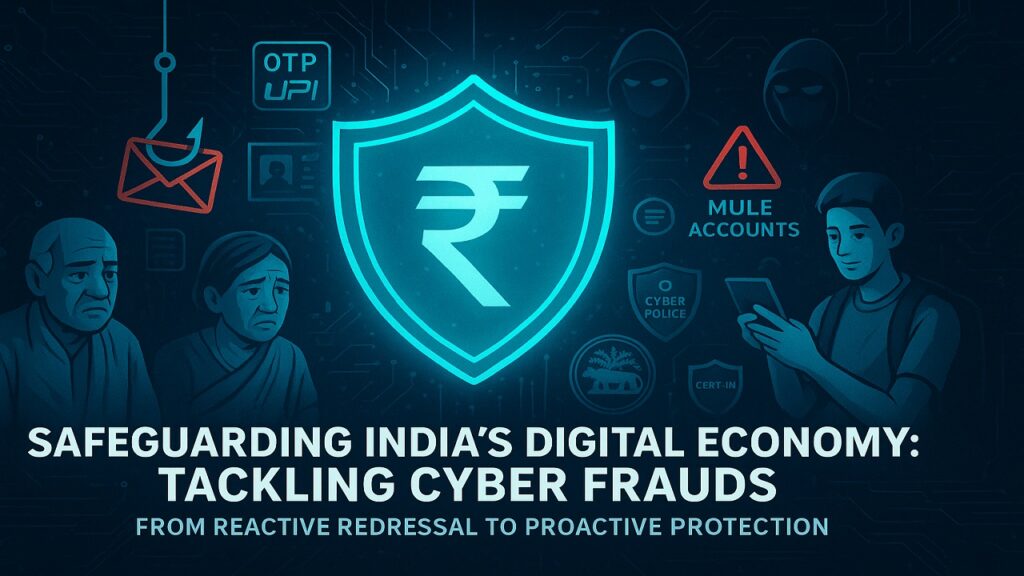
Context
India’s digital economy, one of the fastest expanding globally, has recently been shaken by a surge in sophisticated cyber frauds such as phishing, OTP/UPI scams, identity theft, and the alarming trend of “digital arrests.” These scams not only erode citizen trust but also threaten financial security and the credibility of India’s digital infrastructure, which is central to economic growth.
Cybercrime Landscape in India
- Scale of the Problem: More than 13.9 lakh cybercrime cases were reported in 2023 (NCRB). However, actual figures may be higher due to under-reporting caused by stigma and distrust.
- Illustration: In 2025, a 78-year-old retired banker was defrauded of ₹23 crore in a “digital arrest” scam.
- Tactics Used: Most frauds rely on social engineering—using fear, greed, or urgency. Common tactics include:
- Phishing, OTP/UPI frauds
- Loan and job scams
- Remote access malware
- Fake impersonation of government officials
- Weak Links:
- Elderly and rural citizens – digitally illiterate yet financially vulnerable
- Banks – generic advisories, poor detection of abnormal transactions, proliferation of mule accounts with weak KYC
- Cyber police – shortage of manpower, inadequate training, lack of AI-driven monitoring tools
Constitutional and Institutional Dimensions
- Right to Privacy (Justice K.S. Puttaswamy vs Union of India, 2017) – protection of personal and financial data is a fundamental right under Article 21.
- Article 300A – guarantees the right to property; digital fraud undermines this protection.
- RBI Regulations – mandate zero liability protection to customers in specific cases of fraud.
- CERT-In – nodal agency for cybersecurity incidents under the IT Act, but lacks retail-level fraud prevention capacity.
Key Threats to India’s Digital Economy
- Social Engineering Fraud – phishing, OTP/UPI frauds, job/loan scams, and impersonation frauds.
- Identity Theft & Data Breaches – misuse of Aadhaar, PAN, and bank details due to leaks and weak encryption.
- Mule Accounts & Money Laundering – enabled by weak KYC, making fund recovery difficult.
- Institutional Negligence – banks often fail to flag abnormal high-value transactions; cyber police remain under-equipped.
- Cross-Border Scams – fraud networks exploit jurisdictional loopholes and limited international cooperation.
Initiatives Taken So Far
- Regulatory Safeguards:
- RBI’s zero liability policy.
- Digital Personal Data Protection Act, 2023.
- Institutional Mechanisms:
- CERT-In for incident reporting.
- I4C (Indian Cyber Crime Coordination Centre) for inter-agency coordination.
- Awareness Campaigns:
- RBI’s Cyber Jagrookta Abhiyan.
- RBI Kehta Hai campaign.
- Technological Steps:
- AI-based anomaly detection adopted by some banks.
- National Cyber Crime Reporting Portal for complaints.
Recommended Measures
- Technology & AI Integration: Use AI/ML for anomaly detection, personalised profiling, and blockchain for secure KYC.
- Strengthening Cyber Police: Create 24/7 rapid response units, expand forensic labs, and train workforce in global best practices.
- Bank Accountability: Enforce strict KYC norms, penalise banks that fail to freeze mule accounts, and ensure real-time fraud alerts.
- Cross-Institutional Cooperation: Build a National Fraud Intelligence Grid linking banks, telecoms, and enforcement agencies.
- Citizen Empowerment: Launch targeted digital literacy drives for senior citizens, rural communities, and students.
- Global Coordination: Strengthen cooperation with Interpol, FATF, and bilateral cyber treaties to curb cross-border frauds.
Conclusion
Safeguarding India’s digital economy requires a paradigm shift from reactive complaint-handling to proactive prevention. This can be achieved through AI-driven monitoring, strict bank accountability, empowered cyber police, and digitally literate citizens. By combining technology, institutional strength, and citizen trust, India can build a resilient and secure digital economy capable of withstanding evolving cyber threats.
Source : The Hindu
